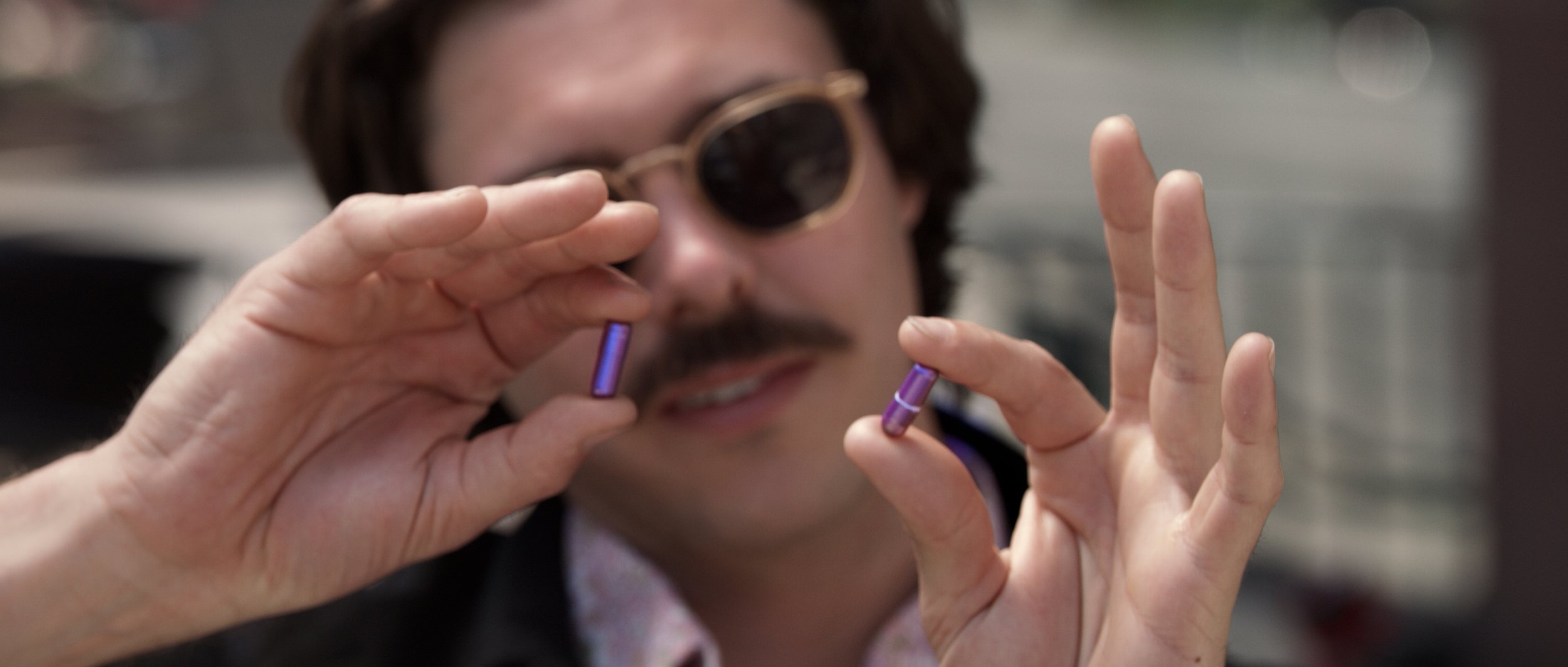The Tomorrow Job: A Time-Travel Film That’s Best Kept in the Past
By John Kirk
Rating: C-
First, a quick recap of Schrodinger’s Cat. It’s a paradox postulated by the Austrian physicist, Erwin Schrodinger that alternate realities exist simultaneously until a choice is made. So, imagine there’s a cat in a box with something that can kill it. We don’t know if the cat is dead or alive until we open the box. Thus, in a sense, the cat can be considered both dead and alive until the choice to open the box is made.
That’s the basic principle behind The Tomorrow Job, a time-travel sci-fi from Epic Pictures, which of course, is also its biggest problem. The problem with time travel stories is that they are rife with paradox.
Navigating these paradoxes is most of the fun behind a time travel story told right. But when one loses track of them, plot holes in the story develop that push the willing suspension of disbelief too far, and the story fails to entertain.
The Tomorrow Job’s Grant Schumacher. Ask your doctor about Time Travel Pills.
Sadly, that’s what happens in The Tomorrow Job.
The film sees a small-time grifter named Lee (Grant Schumacher) use a drug that can propel one’s consciousness into the next day. He uses this to learn secrets and information that he can profit from in the present. The film starts off with Lee and his crew, Finn (Caitlin Duffy) and Martin (Andrew Gombas) on a job where they must recover information in an office for a client. However, this is NOT the job that the tile of the film refers to; it’s another tomorrow job but gets foiled by an unknown organization known as … The Organization.
This is all just clumsy introduction, of course. We’re not supposed to care about this job. We get to meet Lee, Finn and Martin and learn a little bit about their backgrounds and relationship to each other. Lee and Finn are supposed to have some sort of failed romantic history. Martin is the critical sidekick who rankles at Lee’s leadership and we learn about the time-travelling drug. Unfortunately, this is about as much of the characters’ backgrounds as we get.
Like the characters’ back-stories, the science of the drug gets glossed over. Somehow it transports consciousness into one’s future self for a couple of hours. The obvious question that comes up is: what does the consciousness of your future self do in that time?
The answer is, since this has happened in the past, the future self is aware of it and in order to avoid paradox, they basically agree to sit still for a couple of hours to wake up in a predestined location arranged by the past self. Or something.
While we learn that Lee obtained the drug by stealing it from its creator while he was a test subject. We don’t really learn anything else about the other characters, including their motivations.
Essentially, it comes down to money, which is about as generic as one can get in putting together believable characters. The performances are amateurish, the special effects are few and forced and even the stunt choreography – like the pacing of the story - is laboured. There’s a fight sequence between Finn and a faceless opponent that is so grossly telegraphed the audience can guess the next fight move before it happens.
However, the most disappointing feature of this film is the misleading nature of the title itself. The Tomorrow Job isn’t actually a job, if you were anticipating a caper along the lines of Inception or even a science fiction version of Ocean’s Eleven. The Organization is after Lee’s stash of the drug. This, despite the fact that they actually seem to have enough themselves to go back in time an intercept Lee’s crew while they’re on a job. But again, the plot holes abound: how does the Organization know where – or when – Lee will be? Why do they need his drug stash if they are able to research, improve and manufacture their own? Even though Lee might know the whereabouts of the drug’s creator, if the Organization can track Lee, why can’t they just track the creator? However, why argue this point? Fine – it’s still a job, of some sort, I guess.
Then there are the inevitable paradox questions that arise. Why do the future selves need to wait around for two hours? If they already know what’s happened in the past, why don’t they have the freedom to act and help their past selves? The notion of personal choice in time-travel stories creates paradoxes but, in this case, the story can’t handle it, so it gets conveniently ignored. If it’s obvious to the audience though, then it’s just bad story-writing.
I think I remember a modification of Nelson Algren’s famous quote from A Walk on the Wild Side that went: “Never play cards with a man named Doc, never eat a restaurant called Mom’s and never write a science-fiction story about time travel unless you do it right.”
Like the paradox of Schrodinger’s Cat, it’s probably best not to watch The Tomorrow Job. That way, it can both be entertaining and not.
The Tomorrow Job. Written and directed by Bruce Wemple. Starring Grant Shumacher, Caitlin Duffy and Ariella Mastroianni. The Tomorrow Job is playing in select theatres Friday, January 13. Begins streaming on Apple TV/iTunes on Tuesday, January 17.



